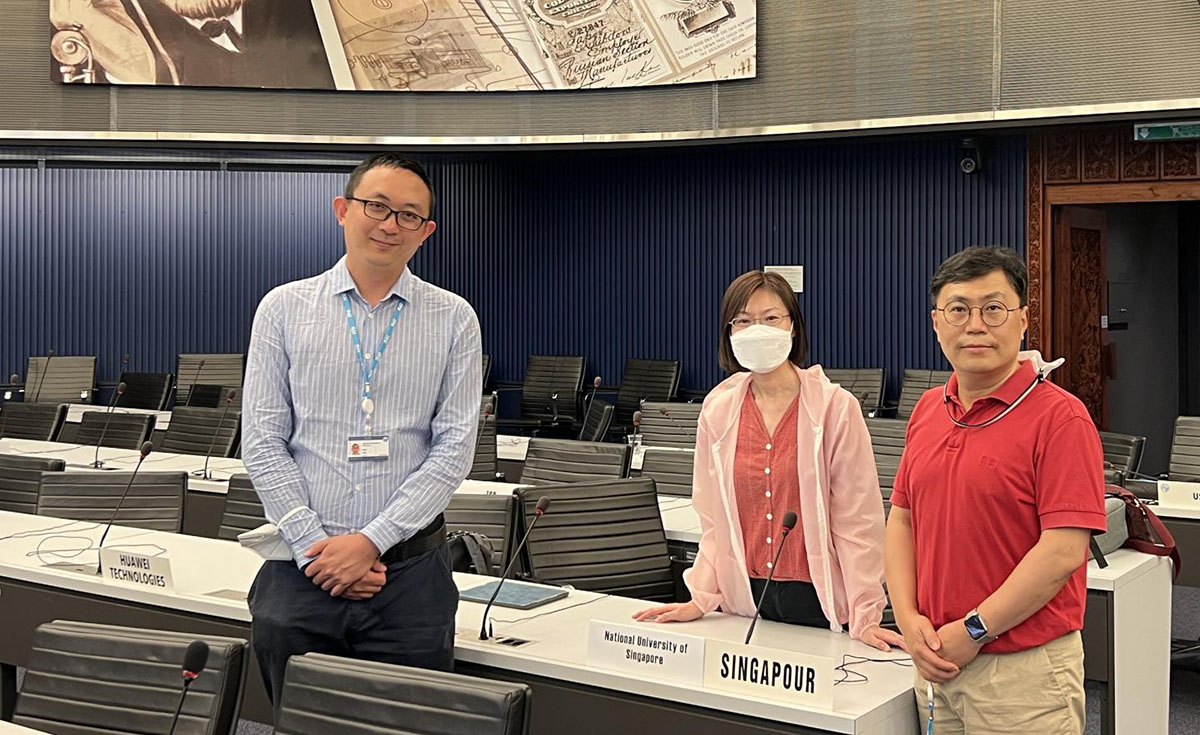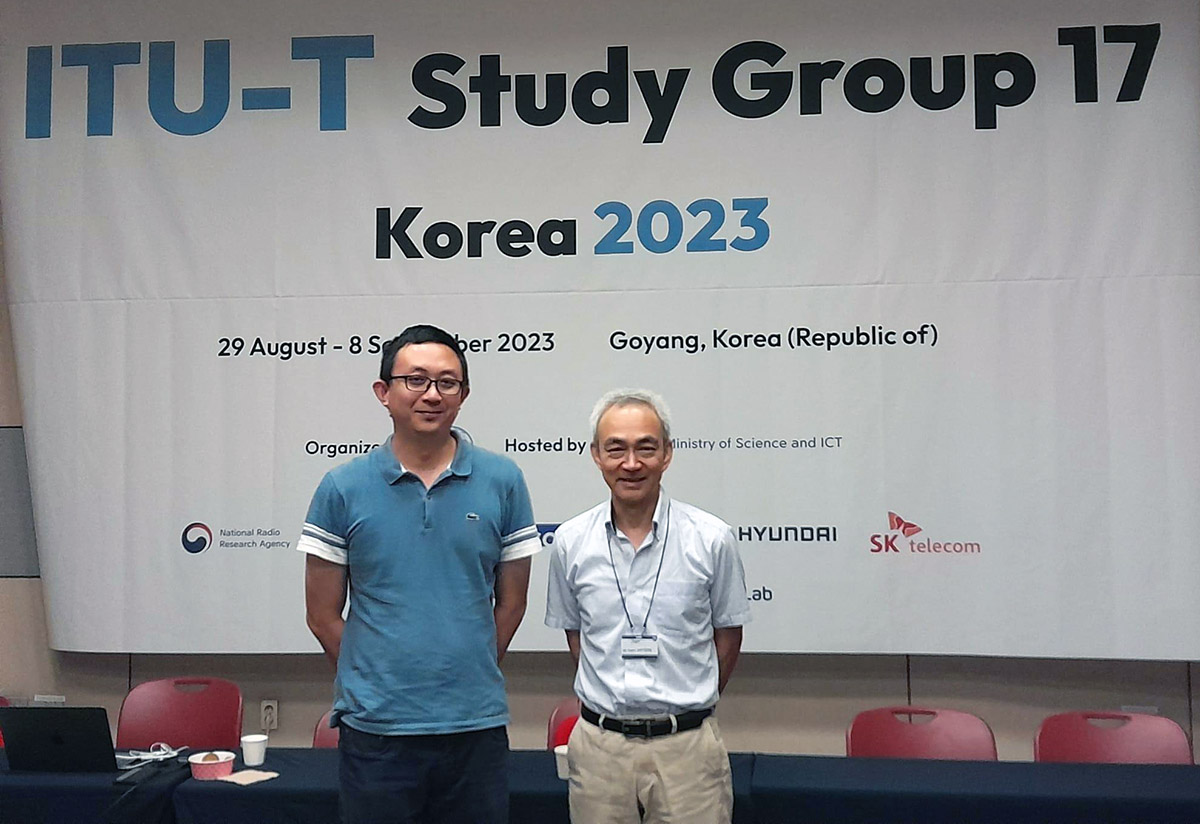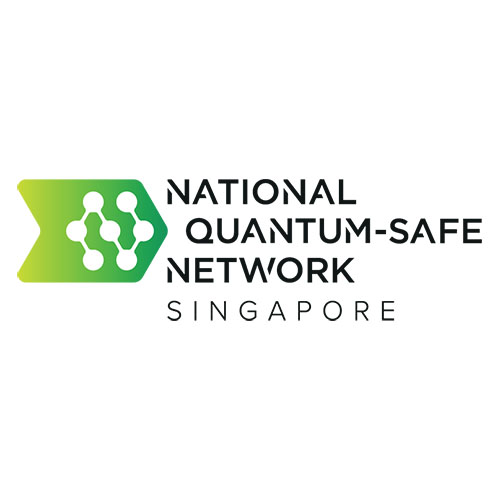Highlights
Driving towards standards for quantum key distribution
 CQT’s Hao Qin (left) from the National Quantum-Safe Network team and Pei Wee Kong (centre) from Singapore’s Infocomm Media Development Authority are championing standards for quantum key distribution. They are pictured with Dong-Hi Sim (right) from SK Telecom at a meeting at the International Telecommunication Union (ITU) in Geneva. Dong-Hi is Rapporteur for the team looking at standards development for QKD in ITU Study Group 17, which is known as Question 15.
CQT’s Hao Qin (left) from the National Quantum-Safe Network team and Pei Wee Kong (centre) from Singapore’s Infocomm Media Development Authority are championing standards for quantum key distribution. They are pictured with Dong-Hi Sim (right) from SK Telecom at a meeting at the International Telecommunication Union (ITU) in Geneva. Dong-Hi is Rapporteur for the team looking at standards development for QKD in ITU Study Group 17, which is known as Question 15.
If there are few official standards for a security technology, how can consumers have confidence using it or vendors certify their products? This issue has become pressing for quantum key distribution (QKD) as networks roll out ahead of standards – but guidance is arriving.
Experts at CQT are contributing to the development of international standards for QKD on different fronts. This work is happening in close collaboration with the Infocomm Media Development Authority (IMDA), which regulates the telecommunications sector in Singapore.
QKD is proposed to offer long-term security for communications, protecting against the risk quantum computing presents to some of today's standard encryption algorithms.
Partners for international standards
CQT’s biggest effort is with the International Telecommunication Union (ITU), a United Nations special agency on information and communications technology and one of the world’s three major international standards development organisations.
From 28 August to 8 September, CQT’s Hao Qin was in Goyang, South Korea, to attend the plenary meeting of ITU’s Study Group 17 on security. Hao Qin is the main proposer and one of two editors for the work item 'Framework of quantum key distribution (QKD) protocols in QKD network', which was on the plenary meeting's agenda for the first time.
Hao Qin worked with his NQSN colleague Haw Jing Yan and IMDA’s Pei Wee Kong to propose the work item as a contribution from Singapore at an earlier plenary meeting of this study group. Representatives from the National Institute of Information and Communications Technology (NICT), Japan, proposed such a work item too. Kaoru Kenyoshi from NICT is the other editor.
 Hao Qin (left) pictured with Kaoru Kenyoshi (right) from Japan’s National Institute of Information and Communications Technology. They are co-editors for the ITU work item 'Framework of quantum key distribution (QKD) protocols in QKD network'. The standard will describe the basic steps from quantum signal exchange through the quantum channel to data post-processing through the classical channel.
Hao Qin (left) pictured with Kaoru Kenyoshi (right) from Japan’s National Institute of Information and Communications Technology. They are co-editors for the ITU work item 'Framework of quantum key distribution (QKD) protocols in QKD network'. The standard will describe the basic steps from quantum signal exchange through the quantum channel to data post-processing through the classical channel.
At CQT, Hao Qin and Jing Yan are Quantum Communications Technologists for Singapore’s National Quantum-Safe Network (NQSN), a testbed for QKD and post-quantum cryptography trials. They have also worked with IMDA to host an ITU workshop on QKD protocols and other standards meetings in CQT.
“Now we’re at this transition stage for QKD to move from academic to industry, standards can play an essential role,” says Hao Qin.
Recently, Singapore launched Southeast Asia’s first quantum-safe network infrastructure to help businesses tap on quantum-safe technologies. IMDA’s NQSN+ will support network operators to deploy quantum-safe networks nationwide, so that businesses have easy access to solutions to safeguard their critical data.
"Standards are key to facilitate interoperability, level the playing fields and promote confidence in the adoption and deployment of technologies. IMDA will continue to work closely with our industry partners to drive local and international standardisation, to benefit the community at large," says Pei Wee, Senior Manager (Standards Development and Regulatory Technology) from IMDA.
The ITU work item’s supporting members include Germany, Singapore, CAS Quantum Network, ID Quantique, NICT, QuantumCTek, SK Telecom and the National University of Singapore.
The ITU standard is expected to be ready by March 2025. “The standard aims to define what all QKD protocols should have in common, which will form an overall framework for different QKD protocols with harmonisation,” says Hao Qin. ITU has already published other QKD standards and has several other work items on-going in different study groups.
Other major standards organisations such as the International Organization for Standardization (ISO) and the International Electrotechnical Commission (IEC) are also making progress. For example, a standard referred to as ISO/IEC 23837 concerning the “Security requirements, test and evaluation methods for quantum key distribution” was published in two parts in August and in September 2023 (part 1, part 2). This standard focuses on the properties of QKD devices.
In this process, Hao Qin served as the Liaison Officer, sharing progress with other standards organisations. Part one of the ISO/IEC 23837 standard also had a co-editor from Singapore: Charles Lim, now Global Head of Quantum Communications and Cryptography, JPMorgan Chase, became involved in the standard development during his earlier tenure as a Principal Investigator at CQT.
Standards at home
For a newcomer, the standardisation landscape can be difficult to navigate. On top of that, QKD is still novel for many in the telecommunications sector. That’s the reason for an effort within Singapore to build local knowledge.
Working with other members of the NQSN team, Hao Qin co-chairs a ‘Quantum Communication Networks Task Force’ under IMDA’s Telecommunications Standards Advisory Committee (TSAC). It has over 20 members from companies and government agencies interested in the technology.
This taskforce published in June 2023 its first local standard on QKD technology: “Reference Specification: Quantum Key Distribution Networks”. The specification gives an overview of QKD networks, referencing relevant standards that already exist.
As the taskforce continues into a second phase, studying aspects of deploying and testing QKD networks, the members will get updates on the ongoing development of international standards.
The NQSN will remain operational as a testbed even as the NQSN+ is developed as a production network for commercial users.
Related Stories
Singapore data centres exchange quantum-safe encrypted files June 05 2023 | |
 | Leadership in quantum-safe networking August 08 2022 |
 | Events build awareness for National Quantum-Safe Network March 03 2023 |






